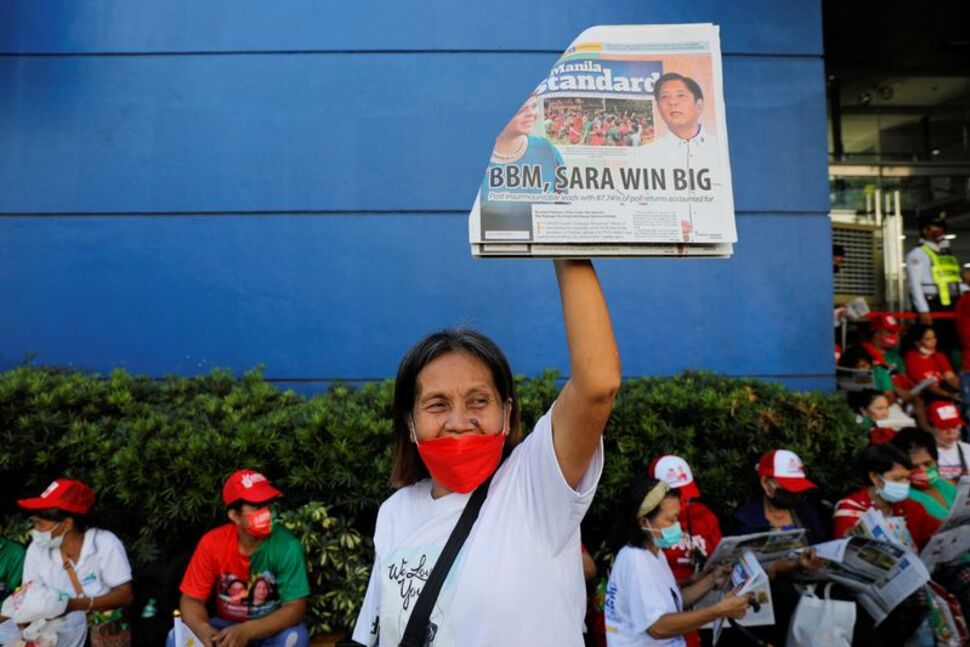
A supporter of presidential candidate Ferdinand “Bongbong” Marcos Jr. holds up a newspaper with the winning of Marcos Jr. on the headline, as people gather to celebrate as partial results of the 2022 national elections show him with a wide lead over rivals, at the candidate’s headquarters in Mandaluyong City, Philippines, May 10, 2022. REUTERS/Willy Kurniawan
On Monday, May 9th, the Philippines held a presidential election to replace President Rodrigo Duterte. Critics characterize Duterte’s presidency as ruthless and authoritarian, moving the Philippines away from a democratic culture. Duterte gained a legacy for using brutal tactics in his approach to countering crime. His violent war on drugs resulted in tens of thousands of killings by state security forces, leading to an investigation by the International Criminal Court. His foreign policy focused on building stronger relationships with Russia and China, while drifting further away from a strong relationship with the United States. Duterte’s decision to retire from politics left a vacuum in Filipino politics. In the May 2022 elections, two candidates became the frontrunners to replace him: Ferdinand Marcos Jr. and former Vice President Leni Robredo. The two ran on opposing platforms. While Robredo promised accountable and transparent governance, Marcos Jr. built his campaign around the legacy of his father. Ferdinand Marcos Senior ruled the Philippines as a dictator for over 20 years, until a revolution ousted him in 1986. Marcos Sr.’s dictatorship marked one of the darkest periods in the Philippine’s history. It was marred by extrajudicial killings, tortures, forced disappearances, corruption, and economic turmoil. Marcos Jr. has utilized his campaign platform to rewrite that history, framing his father’s time in office as a “golden era” for his country. Marcos Jr. claimed a victory on May 9th, winning the election in a landslide. With the Philippines back in the hands of the Marcos family, the Biden Administration should beware of implications this election may have on U.S.-Philippine relations. The troubled history between the United States and the Marcos family may impact the Philippines’ foreign policy decisions. In a country caught between China and the West, the Marcos administration could facilitate the slow decay of democracy.
The relationship between the United States and the Philippines under Ferdinand Marcos Senior ended tumultuously. In the early days of Marcos’ presidency, he took a strong anti-communist stance that appealed to the Reagan administration. The two countries forged positive diplomatic relations. However, as his presidency evolved into a dictatorship, Marcos moved away from the United States. In 1975, his administration oversaw the establishment of diplomatic relations with China. Given Marcos’ shift in foreign policy, and mounting accusations of human rights violations, the United States began to rethink its initial support for Marcos. In 1985, the Reagan Administration took an “open view” about the removal of Marcos Senior from power. A year later, President Reagan reached out to Marcos and personally asked him to step down. It was under this increasing internal and international pressure that Marcos abandoned his post. The United States played a critical role in removing Marcos, which complicated the relationship between his family and the United States. This complicated relationship could be worrisome for today’s administration, as ill feelings may plague Marcos Jr.’s foreign policy. Even more pressing is the outstanding court order from the United States calling the Marcos family to pay millions of dollars in damages to the victims of human rights abuses
In 1995, a court case implicated the Marcos family in a series of human rights violations from the 1970s and 1980s. The U.S. 9th Circuit of Court Appeals affirmed a 1996 verdict labeling Ferdinand Marcos Senior “command responsibility” for the human rights abuses committed under his leadership.[1] The court called for a $2 billion payment from the Marcos family. However, it has been a decades-long struggle to collect that compensation. In 2012, a court upheld a contempt judgement against Marcos Jr. and his mother for failing to provide the compensation ordered in the 1996 verdict. The Marcos family continues to evade payment, despite the existing court order that has been extended until 2031. The outstanding order complicates the new administration’s ability to visit the United States on any official diplomatic business. Unless Marcos Jr. visits as part of a UN-sponsored event, or gains special permission from the United States court system, he runs the risk of being subpoenaed to face the court.
The strenuous circumstances surrounding the Marcos family’s relationship to the United States increases the motivation for Marcos Jr. to turn towards China. Despite disagreements over the South China Sea, Marcos Jr. recently called for shifting the Philippines’ relationship with China “to a higher gear.”[2] He has made promises to strengthen trade and diplomatic ties, as well as increase educational and cultural exchange. A new Philippines under the leadership of Marcos Jr. brings with it new fears. His father’s troubled humanitarian record, his family’s evasion of court orders, and his positioning towards Beijing have all raised concerns that he may bring in an era of democratic backsliding. For the United States, Biden will have to address the legal issues surrounding diplomatic relations with the Marcos family. The outstanding court order should not be abandoned in light of Marcos Jr.’s election; this is a crucial moment for the United States to maintain its commitment to human rights and to democracy worldwide. However, the Biden Administration’s approach to the Philippines will need to deeply consider how to engage with such a complicated figure.
Julia Sackett is an intern at the Foreign Policy Association and a ForeignPolicyBlogs contributor.
[1] https://www.latimes.com/archives/la-xpm-1996-12-18-mn-10301-story.html
[2] https://asia.nikkei.com/Politics/Philippine-elections/Marcos-says-Philippine-China-ties-set-to-shift-to-higher-gear